By the way: Do you know about our “Stress-Free Divorce” service? More details
When divorcing children, spouses have the right to voluntarily decide with which of them the minor children will live.
If there are several children, spouses can even resolve the issue of dividing the children during a divorce by agreeing on with whom one or another child will remain.
Alas, the right given by law often remains only a right, and most often spouses engage in mutual accusations and opposition to normal communication with the child, sometimes even without regard for the interests of the minor.
Note: most often it is the mother who prevents the father from communicating with the child after a divorce due to the fact that the vast majority of disputes about determining the child’s place of residence are resolved in favor of the mother. To achieve meetings with the child, the father has to go to court.
The law, namely Article 66 of the Family Code of the Russian Federation, guarantees a parent who does not live together with his child the right to communicate with him after a divorce. The only basis for restricting communication with a child is harm to the mental or physical development of the minor, but only the court has the right to establish such a restriction.
For example, you can prohibit the father from seeing the child in cases where he abuses alcohol or experts have established its negative impact on the development of the minor.
Negative influence refers to constant insults to the child’s mother or attempts to turn the child against her.
But what should respectable parents do if their ex-husband or wife in every way prevents them from participating in raising their child? We will try to tell you in detail how to get a meeting with your child after a divorce.
How to reach an agreement on how to communicate with your child?
According to the law, the procedure for communicating with children after a divorce can be established in one of the following ways, which we will try to consider in as much detail as possible.
By verbal agreement of parents
If the relationship of the former spouses after the divorce remains normal, they are aware of the responsibility for the development of the child, then they can, without any legal registration, agree on separate or joint time with the child.
Any legal reinforcement of such an agreement is not required here; these are normal, human relations between once-loved people who have a joint child or children and bear joint responsibility for the well-being of their children.
Often it is not possible to solve the problem on your own
By written agreement of the parents
In cases where there is a risk of conflicts on raising children or in order to prevent possible abuse of rights, former spouses can determine in writing: on what days and at what time, for how long, with what frequency, in what place, not living in the family the parent will have the opportunity to visit the child after the divorce, as well as any issues regarding his participation in the upbringing of the minor.
In addition, the place of residence of children and obligations to pay child support by a separate parent can also be fixed by such agreements.
Example of an agreement on the place of residence of children
Similar to the agreement presented above on the place of residence of children, the procedure for communicating with them is also established.
Article 66 of the Family Code stipulates that this agreement can be concluded in writing, but is not specified - in simple writing or notarized. As practice shows, it is still more advisable to have such documents certified by a notary.
Most often, such a document is required when the former spouses still argue about at what time and for how long the child will be with the parent living separately, but subsequently decide to come to an agreement peacefully by signing an agreement.
Determining meetings with a child through the court
If the former spouses were unable to agree on the procedure for communicating with the child after the divorce, or the written agreement is regularly violated by one of the parents, the dispute must be resolved exclusively by the court with the mandatory involvement of the guardianship and trusteeship authorities.
Claims may be filed in court on the following issues arising from disputes about communication with children of either parent:
- A claim to determine the procedure for communication between a minor child and a parent living separately;
- Claim for restriction of parental rights (Article 73 of the Family Code of the Russian Federation);
- A claim to determine the order of communication of a minor child with other relatives.
All of the above claims must be filed in the district court. The state duty for one non-property claim is 300 rubles.
Claim to establish a procedure for communication with a child
The claim must contain:
- Name and address of the court.
- Details of the plaintiff, defendant, their addresses and other contact information.
- Next, the state bodies competent to give an opinion on the case are indicated - the guardianship and trusteeship authorities at the place of registration of the plaintiff and defendant.
- A brief summary of the circumstances of the dispute.
- The requirement to determine the order of communication with the child, specifying exactly how.
- Listing of all documents attached to the claim.
- Date and signature of the plaintiff (or his representative).
An example of a statement of claim to determine the order of communication with a child
You can independently prepare a statement of claim to determine the order of communication with the child.
It is worth paying special attention to drawing up a schedule of communication with your child; it is important to clearly indicate the days of the week, specific dates (for example, your birthday or your child’s birthday), public holidays, communication hours, meeting places, joint annual leave, in the presence or without the presence the second parent will undergo communication, etc. These details may be of fundamental importance for the future execution of a judicial act on determining the order of communication with the child. We recommend that you first consult with a family law lawyer on this issue.
Download a sample statement of claim to determine the order of communication with a child
Court decision in the case
The court, having heard the arguments of the parties, examined all the evidence, and examined the conclusion of the guardianship and trusteeship authorities, makes a decision on the case.
A judge has the right to refuse a claim to establish a procedure for communication with a child if circumstances are established that negatively affect the child’s psyche when communicating with a parent living separately, or if the plaintiff’s deliberately dishonest intentions in relation to the child are revealed. The court has the right, for example, to establish meetings between the father and the minor exclusively in the presence of the mother.
Note: Communication with a child can be understood as any contact between a parent and a minor: live communication, meetings, spending time together, any methods of remote communication - correspondence, phone calls, video calls, SMS, etc.
In addition, when making a decision on the order of communication between the father (mother) and the child after a divorce, the court takes into account:
- The child’s age and state of health.
- Relationship of a minor with a separate parent.
- The conditions under which communication with the child is planned.
- Time and frequency of communication.
- Will the interests and rights of the child be violated when the claim is satisfied, will this negatively affect his studies, health, development, etc.
The court has the right to take into account all possible direct and indirect evidence. It can be:
- Conclusion of the guardianship authority.
- Certificates, characteristics at the place of residence or work of parents.
- Testimony of witnesses.
- Other documents.
If there are no grounds for refusal, the court makes a decision to establish a procedure for communication with the child in the form in which the plaintiff requested, or with changes.
Court decision to determine the child’s place of residence, the order of communication with the child and not to interfere with the father’s communication with the child
The parties can also end the consideration of the case by signing a settlement agreement if they come to mutual agreements during the court hearings. This happens quite often in judicial practice. The parties prepare and sign a settlement agreement, which sets out all the agreements reached on establishing the procedure for communication between the separately living parent and the child.
Settlement agreement to determine the order of communication between an estranged father and his children
When such an agreement is signed, the court no longer makes a decision on the procedure for communication, but approves the settlement agreement of the parties with a ruling.
In the ruling, the court also explains to the parties the consequences of signing such an agreement, according to which repeated appeal to the court in a dispute between the same parties, about the same subject and on the same grounds is not allowed. The proceedings are terminated.
Court ruling on approval of a settlement agreement on the procedure for communication between an estranged father and children and termination of proceedings in the case
- If the determination of meetings with the child through the court has taken place, the judicial act has entered into legal force, but the defendant still opposes the normal relationship between the plaintiff and the minor, he may be held administratively liable in the form of a fine.
- In the event of a systematic violation of the order of communication established by the court, the plaintiff has the right to demand a review of the child’s place of residence, despite the previously made decision to determine the order of communication with the child.
When resolving disputes about children, one should be guided not by emotions generated by hostility towards the ex-spouse, but by common sense and the desire to preserve a happy childhood for the child. Only a cool head and understanding of the mechanisms of judicial protection will help you defend your right to raise your child and achieve justice.
Lawyers at ICPI “Planet of Law” are ready to provide any legal assistance in disputes about children of any complexity, from consultation to comprehensive case management. You should not risk your child’s future; inaction and conflict with your ex-spouse can cause irreparable harm to the child’s psyche. Call + 7 (495) 722-99-33.
Communication with a child after divorce according to the law: judicial practice - I have the right
The Family Code of the Russian Federation states that a child has the right to fully communicate with both his mother and father. Divorce of parents becomes a serious trauma for the child. There are often cases when adults use children in order to achieve certain benefits in the struggle among themselves. Mothers prohibit fathers from seeing their children, and fathers stop paying child support. It depends only on the parents how the baby will cope with the separation of mom and dad. Former spouses are advised to forget grievances and quarrels, and establish communication with the child according to the law after a divorce. Find out what rights a father has to a child after a divorce in 2023 in the article below .
Parents' rights to communicate under the law: judicial practice
The main problem that parents must solve is who the child will stay with after the family breaks up. As judicial practice shows, most often the decision is made in favor of the mother. Women often abuse their rights and limit meetings between the child and the father.
Such actions are illegal, since a man has the right to participate in the life and upbringing of a child. The ex-spouse can solve the problem by contacting the guardianship and trusteeship authorities or the court. During the court hearing, the order of communication between father and child will be established.
It is worth noting that sometimes dad's visits harm the physical or psychological health of the baby. For example, if a man insults his ex-wife in front of the child, meetings are restricted by court order.
Article No. 55 of the RF IC states that the baby has the right to communicate not only with mom and dad, but also with relatives on both sides . Separation, quarrels and conflicts should not interfere with the implementation of this right.
There is no information in regulatory legal acts about the amount of time a man should spend with a child. Parents resolve this issue in court, or try to reach an amicable agreement. The result of the negotiations is the conclusion of a voluntary agreement between the former spouses, which indicates a schedule of meetings.
How to determine the order of meetings with the father by agreement?
There are several ways to determine the order of meetings between a father and a child after a divorce :
- Verbal agreement between parents;
- A written agreement certified by a notary;
- Going to court.
If the spouses separated peacefully and maintained normal relations, an agreement will not be required. The schedule and time of meetings with the father are determined independently, for example, the baby lives with his mother from Monday to Friday, and the father takes him to his place on Saturday and Sunday.
The woman does not interfere with meetings, does not impose additional conditions and does not control communication. However, not all married couples maintain friendly relations after separation.
In case of infringement of the rights of one of the parents, it is necessary to record in writing the answers to all controversial issues. The voluntary agreement defines:
- The territory where the meetings will take place;
- Number of visits per month, duration;
- Ways to spend time with your child;
- Can other relatives attend meetings?
The agreement is drawn up in any form, but you will need to provide the following information:
- Parents' passport details;
- Location;
- Personal information about the child.
The text should contain specific information: days of the week, visiting times, a list of places for leisure activities. In the final part of the agreement, the former spouses put their signatures. This means that both parties agree to the terms stated. Parents will not be able to change the contents of the document on their own. The voluntary agreement is certified by a notary. Before signing, he checks whether the child’s rights are being violated.
If for some reason a woman violates the terms of the agreement, the ex-husband has the right to file a lawsuit to determine the order of communication . Often parents involve the guardianship and trusteeship authorities to solve the problem. Their intervention will allow the conflict to be resolved out of court.
Cases involving violations of a parent's rights to communicate with a child are heard in district courts. The meeting schedule is revised at the request of the father or mother. Violating the terms of a voluntary agreement is a serious offense.
According to the law, a man has the same rights as a woman and can claim equal communication with his own offspring. The court may divide the summer holidays, allow meetings during the New Year holidays, etc.
Determining the time of communication with a child in court
If, after separation, the parents were unable to maintain a normal relationship, then the conflicts that arise are resolved through the courts. To do this, file a claim to determine the order of communication with the child with a request:
- Determine the time the child communicates with each parent;
- Limit or deprive the father of parental rights after divorce if the reasons specified in Article No. 66 of the RF IC arise;
- Set a time for communication between the child and other relatives (grandparents).
The application is drawn up according to the sample. It contains the following information:
- Information about the plaintiff and defendant;
- Information about the child;
- Address and location of the court;
- Data on marriage, divorce;
- Grounds for going to court. Situations in which the rights of the father were violated are listed, attempts to come to an amicable agreement with the ex-wife are described;
- Evidence base. Facts are confirmed by documents or testimony;
- Claim. In this case, establish a procedure for communicating with the child;
- List of papers attached to the application.
In the final part, the claim is signed and the date for going to court is set. In addition, the plaintiff draws up a communication schedule that, in his opinion, will be suitable for him and the mother.
The judge carefully examines all the features of family relationships. When making a decision, the following are taken into account:
- Opinion of guardianship authorities;
- Evidence presented by the parties;
- Certificates attached to the claim.
If the court finds no obstacles to satisfying the requirements, the schedule proposed by the child’s father will be approved. Bailiffs will monitor the execution of the court decision. If in the future the mother continues to interfere with communication with the child, she will be brought to administrative responsibility. If there is a systematic violation of the court verdict, the baby will be handed over to his father for upbringing.
Download a sample statement of claim to determine the order of communication with a child below.
Download a sample claim to determine the order of communication with children
Father-baby bonding time
According to the law, the time of communication between the child and the father is not limited. Not a single regulatory legal act contains information about how much time a man is obliged to devote to his offspring.
There are exceptions when the mother, for serious reasons, is forced to supervise the visits of her ex-husband. Until the woman gets through the court to limit communication, the man has the right to spend as much time with the baby as he wants.
It is worth noting that the desire to see the child should not be spontaneous: each of the parents has daily affairs, work, or a new family. When proposing a schedule of visits, it is necessary to take into account the listed circumstances. In addition, the baby’s hobbies, attachment to parents, his preferences and age are taken into account.
For example , the communication schedule with a one-year-old child differs from meetings between a father and his teenage son. Obviously, a newborn baby does not need entertainment, going to the movies, etc.
To accept a man as a father, it is enough to spend a couple of hours a day with him. In the second case, the ex-spouses agree on trips for the child and father on vacation, and other ways to spend leisure time.
It is recommended to foresee options for sudden visits from the father to the child. There are situations when a man has free time to communicate or a mother needs urgent help.
Vacation with a child abroad
Joint recreation with a child is the right of every parent. However, when planning trips to another country, it is important to take into account the opinion of your ex-spouse. After the dissolution of a marriage in which a child was born, the consent of the other parent must be obtained for certain actions.
According to Family Law, the father's permission is required to cross the border of the Russian Federation with a minor child. If the baby leaves the country with his grandparents, both parents must write consent.
The father and mother independently decide whether to send the child abroad or not. Consent to leave is drawn up in writing and certified by a notary . The paper is sent to:
- Migration Service of the Russian Federation;
- The customs control point through which you plan to cross the border;
- Embassy or consulate.
What documents will be required when traveling abroad with a child? When traveling abroad with a child, the father must present:
- Identification document of the baby (birth certificate or passport);
- International passport;
- A photocopy of the divorce certificate;
- Notarized permission to leave from the ex-wife.
If a woman does not agree to sign a permit to visit another country, the ex-husband has the right to go to court to solve the problem and protect her interests. The child's mother will need to explain the refusal, documenting her reasons. If the judge does not see significant reasons for the ban, the second spouse will receive official permission to leave.
Prohibition and restrictions on communication with a child
After a divorce, ex-spouses find it difficult to find the strength to continue communicating. Even having a common child does not stop conflicts. The causes of quarrels are not only past grievances, but also the immoral behavior of a man. Because of this, women wonder whether it is possible to prohibit the father from seeing the child?
Article No. 73 of the Family Code of the Russian Federation lists the grounds on which the court deprives or limits the father of parental rights. These include:
- Refusal of a man to support a child;
- Non-participation in the life and upbringing of the child;
- Leaving a minor in government institutions;
- Use of physical force on a child or mother;
- Abuse of alcoholic beverages and narcotic substances.
The listed grounds are an absolute reason for deprivation of parental rights. If a woman proves at least one of these allegations in court, the father will be prohibited from communicating with the child.
There are reasons that influence the judge’s decision when establishing the order of communication between a man and a child after a divorce. They are not specified in the Family Code of the Russian Federation, but are taken into account when considering the case. Limitation of meetings occurs if the father:
- It has a bad effect on the child’s psyche, instills bad habits, and promotes cruelty;
- Interferes with education and interferes with the child’s mental development;
- Humiliates the ex-wife, turns the child against her;
- Violates the mother's right to communicate with her son or daughter, hides the children from the woman for a long time.
An example from judicial practice
After the divorce, the spouses did not enter into a written agreement, but verbally agreed on the procedure for meetings between father and son.
The mother did not interfere with communication, and the ex-husband took the child to his place for the weekend. After some time, the woman began to notice that her son was returning from his father in a depressed mood, insulting his mother, accusing her of destroying the family. Over time, the situation worsened, the child began to study worse and skipped school.
After talking with mutual friends, the woman found out that the father was turning his son against her, talking about her dishonesty, about non-existent infidelities in marriage. The ex-wife wrote a statement to the court asking the man to limit his communication with his son .
Witnesses confirmed Fedorova’s words, and the court took her side. A schedule was drawn up according to which meetings between father and child should take place only in the presence of the mother.
Forensic examination in determining the time of communication
It is quite difficult to prove a man’s bad influence on a child, so the judge invites a psychologist to participate in the hearing. The decision is made after conducting an examination and receiving a conclusion from a specialist about the child’s psychological state.
In addition, the forensic expert answers the following questions:
- How attached is the child to his mother and father?
- Does the father have a negative influence on the child's opinion of the mother?
- Is a man's behavior dangerous for a baby?
When considering cases involving children, the judge is interested in the opinion of a child over 10 years old.
Ways to limit meetings
How to legally limit a child's communication with his father?
If a woman wants to limit her ex-husband’s contact with the child due to immoral behavior, the procedure should be as follows:
- Collect evidence (certificate of arrests to the police, testimony of witnesses, recordings of conversations, fragments of correspondence);
- Obtain a doctor’s opinion on the child’s mental health;
- Submit an application to the court and attach evidence to it.
Guardianship authorities are invited to consider the case of restricting communication between the father and the child.
The application is submitted to the court at the place of residence of the former spouse. A woman has the right to indicate additional requirements in her claim, for example, to ask the judge to order alimony.
The court hearing takes place in the same order as when establishing a schedule of meetings with the child. However, there are also differences:
- An employee of the prosecutor's office is invited to participate in the process;
- The judge does not consider the basic rights of the father, but the possibility of limiting them.
The decision is made after studying the case materials. If a father is limited in communication with his child, the following consequences occur:
- The man is required to pay child support;
- Meetings between father and child take place in the presence of the mother or a representative of the guardianship authorities;
- During the restrictions, the man is deprived of payments established by the state for parents.
Despite the restriction of communication, the child retains the right to use the father’s property and claims to inherit.
How can I challenge a restriction on communication with a child?
The court's decision can be challenged in the future if the man corrects his behavior towards the baby. To do this you will need:
- Submit an application to establish a new order of communication (if the court has limited meetings with the child after the parents’ divorce);
- File a lawsuit to remove restrictions on parental rights.
If the father has changed, it is possible to achieve meetings without litigation. It is enough to talk to your ex-wife and explain your position to her. With the woman’s consent, the father will be able to visit the child and spend time with him.
Determining the procedure for communicating with a child after a divorce
Communication with a child after a divorce is the right of every parent, which is guaranteed by Art. 66 of the Family Code of the Russian Federation. On the other hand, Art. 55 of the RF IC states that every child has the right to communicate with a parent, regardless of the cohabitation and marriage of the mother and father.
Rights and responsibilities of parents
Chapter 12 of the IC of Russia establishes a complete list of the rights and responsibilities of parents in relation to their children. In particular, the following principles must be taken into account:
- mother and father have equal rights and responsibilities;
- termination of rights is carried out in the event of deprivation of parental rights in court;
- possible limitation of powers;
- After eliminating the violations, restoration of paternity/maternity is allowed.
This list is valid for the biological mother and father, as well as adoptive parents after the court decision on adoption has entered into legal force.
Communication between the child and the second parent after divorce
The law guarantees equal rights of mother and father, regardless of the address of residence (Article 66 of the RF IC).
Communication is accompanied by meetings with children, participation in their upbringing, and resolution of issues related to development and education.
The second parent, the legal representative with whom the minor lives, should not and cannot interfere with communication with him. The exception is harm to the child’s psychological or physical health.
The procedure for communication is established by a settlement agreement or by the court based on the claim of one of the parents. For violation of established conditions, legal liability rules may apply.
Who will the children stay with after the divorce?
As judicial practice shows, in 80% of cases, children remain with their mothers after divorce. This is due to psychological reasons, as well as the belief that a woman can take care of her child much better than a father.
It is extremely rare for minors to be handed over to their fathers. Most often this happens by mutual consent of the parents or under the following circumstances:
- woman's abuse of illicit drugs;
- recognition of her incapacity;
- The mother's health does not allow her to fully engage in parenting.
You can learn more about the specifics of establishing guardianship over minors by following this link.
The procedure for communicating with a child by agreement
Free legal consultation We will answer your question in 5 minutes!
After the divorce process is completed, the separated parent has the following rights:
- regular meetings with children;
- unlimited communication with them;
- obtaining information about children at any time (in educational and medical institutions);
- expressing personal opinion on all issues related to the upbringing and maturation of a minor;
- regulation of issues related to the movement of children outside Russia.
Taking these rules into account, parents can independently discuss the procedure for communicating with their child after a divorce. This can be done orally or in writing.
The law only recognizes written agreements drawn up by a notary. Parents are required to independently draw up a settlement agreement indicating the circumstances of communication, as well as measures of liability for violating the terms of the agreement. The document has legal force and begins to be valid from the moment the agreement is registered by a notary.
This is also important to know: How to return your maiden name after divorce?
Oral agreements have no legal force, so it is unlikely that an unscrupulous parent will be held accountable. But if the mother and father can resolve all conflicts on their own, then this method will be more useful for the child - it eliminates psychological trauma.
Schedule of communication with the child
The communication schedule is the main issue on which disputes and conflicts arise between parents. The mother and father will have to discuss the following issues:
- meeting places;
- regularity of visits;
- duration;
- the presence of unauthorized persons during meetings;
- the possibility of a long vacation together (for example, a trip to the sea during the holidays).
When scheduling meetings, you should take into account the age of the children and the work schedule of the parents and the child.
Contents of the agreement
The contents of the settlement agreement must contain the following categories of information:
- visiting schedule;
- possibility of deviation from the routine;
- liability of participants for violation of conditions;
- additional support issues (for example, the cost of purchasing a trip to the sea during a joint vacation).
Sample agreement on the procedure for communicating with a child
Settlement agreement
on the procedure for parent participation in the child’s life
February 12, 2023 Sochi
Father: Anton Petrovich Belokolov, born May 18, 1974, resident: Sochi, st. Petrovskogo 14/7, passport NM 125478, on one side;
Communication with a child after a divorce according to the law, is it possible to prohibit a father from seeing a child, the order of meetings between a father and a child after a divorce, a claim to determine the order of communication with a child
Family law pursues the goal: to provide parents with the opportunity to exercise their parental rights, and for children to have the opportunity to fully communicate with their father and mother. Especially after a divorce, which in itself is a serious trauma for both parents and children.
In fact, the opposite often happens: instead of maintaining normal relationships, ex-spouses use children as targets or weapons in the fight against each other. Often the mother prevents communication with the child after a divorce, and the father demonstratively refuses to raise and support the children. And everyone only suffers from this.
In this article we will try to understand the ups and downs of communication between parents and children after a divorce. And determine the procedure for overcoming controversial issues.
Limiting communication between father and child after divorce
Since in most cases, after a divorce, the child remains with the mother, it is the mothers who become opponents of full communication between father and child.
The mother begins to abuse her rights and infringe on the rights of the father for a variety of reasons (including because of resentment and the desire to take revenge on her ex-husband).
She herself determines the order of meetings between the father and the child, limits the time they communicate, and sometimes does not allow them to see each other at all.
Sometimes the father is not at all embarrassed by this state of affairs. But as a rule, the father defends his legal rights to communicate with the child after a divorce.
How many times can a father see a child after a divorce according to the law?
Mothers often ask whether it is possible to legally prohibit a father from seeing his child.
Question
On the topic “Communication with a child after a divorce according to the law, is it possible to prohibit a father from seeing a child, the order of meetings between a father and a child after a divorce, a claim to determine the order of communication with a child,” we have collected examples of documents that may interest you.
Answer
However, in some cases, the father’s communication with the child may be limited by the court if this communication is harmful to the physical or psychological development of the child. For example, if the father leads an immoral lifestyle, uses alcohol or drugs, insults his ex-wife, turns the child against the mother, and the like.
If the father’s behavior does not cause any complaints, there is no reason to limit his participation in the child’s life. The father can also go to court if he believes that the mother is violating his legal right to participate in raising joint children.
Unfortunately, the law does not specify the permissible number of hours or days that a father can spend with a child.
But this only means that parents need to independently (or with the help of the court) reach an agreement on the procedure for communicating with the child.
The schedule and order of meetings will directly depend on circumstances such as the age of the children, the degree of affection, distance, employment and the capabilities of the parents.
Below we will look at how and in what form a schedule for meetings between parents and children is established.
On the topic “Communication with a child after a divorce according to the law, is it possible to prohibit a father from seeing a child, the order of meetings between a father and a child after a divorce, a claim to determine the order of communication with a child,” we have collected examples of documents that may interest you.
How can parents reach an agreement on how to communicate with their child?
Parents can determine the frequency and duration of meetings between father and child (as well as other features of their communication, depending on the circumstances) in several ways. The law provides for the possibility of drawing up a written agreement or going to court. In practice, an oral agreement between parents is also possible.
Verbal agreement between parents
It’s good if the former spouses maintained human relationships after the divorce. If parents understand the importance of the child's communication with both mother and father, and are equally responsible for his upbringing, they can agree verbally. No documents are required.
For example, according to an oral agreement, the father takes the child to his place every weekend, and the mother does not control the communication process, since she recognizes the ex-husband’s right to raise their common child.
Of course, not every parent can boast of such a conscientious attitude towards their parental responsibilities and such a respectful attitude towards each other.
Written parental agreement
Question. My wife and I divorced, we have a 10-year-old child together. My wife and child live in another city, quite far away - 200 km away.
To see my son, I come to see him at least once or twice a month. But my ex-wife is wary of letting the child go with me, so I only have one day at my disposal.
Does the wife have the right to dictate the terms of meetings with the child? Is it possible to enter into a written contract with my wife?
If one parent abuses his rights or infringes on the rights of the other parent, if there are disputes between the parents about how often meetings should take place with the child, it would be reasonable to formulate these rights in writing by drawing up a special agreement. In it, among other conditions regarding joint upbringing and parental participation in the life of a son or daughter, it is necessary to provide ...
- Place and time of meetings;
- Duration of meetings (for example, number of hours - on weekdays and weekends, days - during school holidays);
- Types of joint leisure and unacceptable ways of spending time;
- The possibility of the second parent and other relatives being present at parent-child meetings.
There is no need to have the agreement certified by a notary. But if parents want to be sure that the document does not contradict the interests of the child, it can be agreed upon with the guardianship and trusteeship authority.
Determining meetings with a child through the court
It happens that after a divorce, the relationship between the former spouses is so destroyed that it is impossible to peacefully agree on communication with the child. And it happens that a previously concluded written agreement is simply ignored by one of the parents. In this case, the dispute is resolved in court with the obligatory participation of the guardianship and trusteeship authority.
Question. My son divorced his wife. The common child lives with his mother. The ex-wife strictly limits the time spent together between father and child and is personally present during their communication.
And judging by how insecure and fearful the child behaves during these rare, short and very uncomfortable meetings, the mother is turning the child against the father.
How to achieve normal meetings with a child after a divorce?
Depending on the circumstances, the following claims may be filed:
- on determining the order of communication between a mother or father and a minor child;
- on restricting communication between a father or mother and a child after a divorce (if the circumstances specified in Article 66 of the RF IC occur);
- on the procedure for communication with the child of other relatives (specified in Article 67 of the RF IC).
Disputes between parents about children are resolved exclusively by the district court, and a statement of claim must be filed there to determine the order of communication with the child.
Schedule of communication with the child
One of the attachments to the statement of claim may be a schedule of communication with the child . This document contains an approximate or exact schedule of meetings between parents and the child, their time and duration, place and method, as well as other forms of communication (telephone calls, correspondence) .
Parents will have to draw up a schedule for communicating with their child on their own, depending on the circumstances and characteristics of family relationships. If serious difficulties arise, you should seek help from a lawyer.
Procedure for communicating with children after divorce - time and hours
It must be said right away that the law does not provide any restrictions on the amount of time a father or mother spends with a child.
Restrictions are established in exceptional cases, for example, if the mother is categorically against it, and the father has to seek meetings with the child in court, or if the mother has good reasons to limit the father’s time together with his daughter or son.
It is important for both mother and father, if they are not deprived of parental rights, to fulfill the role provided by law in the life of the child, maintain relationships with him, educate him, and take part in his development and formation.
At the same time, it must be taken into account that the father’s possibilities are not limitless, taking into account work, workload with other matters, distance, and sometimes a new marital status. On the opposite side there may also be reasonable restrictions.
Therefore, the schedule of meetings between the parent and the child is formed taking into account all significant circumstances, such as the parents’ employment, separation, as well as the age of the child, his capabilities and wishes, and the degree of attachment between the parent and the child.
It is advisable to include in the schedule the possibility of spontaneous, unplanned meetings. After all, even the most organized mother may suddenly need help with her child, or the busiest father may have free time to meet with his child.
Judicial practice in cases of this category is based on the fact that the order of meetings between parents and children must be extremely specific and clear .
Uncertainty, the lack of an exact schedule of days and hours makes the court decision unenforceable, allows for the possibility of manipulation and mutual claims, puts parents and children in a dependent position, and prevents planning and compliance with the child’s full-fledged regime.
So, the schedule of communication with the child should contain a specific schedule:
- days of the week and hours (on weekdays and weekends, holidays);
- time, place of meetings;
- duration of meetings;
- ways to spend time;
- the possibility of presence and accompaniment (for example, mother, maternal or paternal relatives - grandparents, siblings and half-brothers);
- procedure for joint school holidays and parental leave.
In this case, the individual circumstances listed above must be taken into account.
Consideration of the case and court decision
Question. My husband divorced me because of an affair with another woman. After the divorce he married her. In our marriage a child was born, he is now 3 years old.
The ex-husband takes the initiative to meet with him, but wants to see the child at any time convenient for him, and also, at his own request, take him to his place. My participation in these meetings is categorically unacceptable.
He says he will achieve this through the courts. Can the court accommodate the husband?
Having considered the plaintiff's application, the court examines the case materials. The following circumstances are taken into account:
- The age of the child, the level of his physical and psychological development;
- The moral qualities of the parent, the order of meetings with whom is determined by the court;
- The schedule of communication with the child proposed by the plaintiff - the time and regularity of meetings, the conditions and method of holding meetings.
To make a fair decision, the court relies on the following evidence:
- recommendations of the guardianship authority;
- parental characteristics;
- witness statements, recordings of conversations, letters.
If there are no grounds for refusing to satisfy the claim, the court, by its decision, approves the order of communication between the father and the child in the form requested by the plaintiff (taking into account the changes and additions made to the claims during the judicial review process).
If the court finds that satisfying the claim will violate the child’s interests, that meetings with parents will negatively affect the child’s physical and psychological development (for example, affect his well-being, behavior, and success at school), the plaintiff’s claims will be rejected. The court may also limit visits between the father and the child (for example, only in the presence of the mother).
Liability for violating the order of communication with a child established by the court
If a court decision to determine meetings with a child has entered into legal force, but one of the parents still acts in his own way, preventing the child from having a normal relationship with the other parent, he can be held accountable. There is a fine for such a violation.
For systematic violation of the order of meetings determined through the court, one of the parents has the right to demand a change in the child’s place of residence (for example, if the mother categorically denies the father the opportunity to see and raise their common child, the father can ensure that the child lives with him).
ASK A LAWYER A QUESTION FOR FREE
- Due to frequent changes in legislation, information sometimes becomes outdated faster than we can update it on the website.
- All cases are very individual and depend on many factors. Basic information does not guarantee a solution to your specific problems.
That's why FREE expert consultants work for you around the clock!
- Ask a question via the form (below) or via online chat
- Call the hotline:
- Moscow and the Region -
- St. Petersburg and region -
Procedure for communicating with children after divorce: time and hours
Nowadays, half of marriages break up. In 60% of such families there are already children who are destined to stay with either their mother or their father. Divorce is a great trauma for a child as he loves both ancestors equally.
Adults simply must forget about the war with their ex-partner and, if possible, peacefully resolve issues about the procedure for communicating with children after a divorce; the time and hours of visiting must also be determined immediately.
Right to communicate with a minor
There are ex-wives and husbands, but there are no ex-mothers and fathers. The law provides for an equal opportunity for both to exercise their parental rights and fulfill their responsibilities. This option does not depend on living together or apart.
A child has an inalienable right to communicate with both his mother and father after their divorce. Only a court is authorized to prohibit seeing a child if there are compelling reasons for doing so.
In addition to mom and dad, close relatives also express a desire to see their children: grandmother, grandfather, uncle, aunt, brother, sister. Communication should be pleasant and useful for both parties. A ban on dating is not legal if the child wants to date.
It is generally accepted that the court in any case leaves the child with the mother. But it is not so. In 5% of 100%, the court remains on the side of the fathers. And if there is more than one child in the family, you can leave one place to live with the mother, and another place to live with the father.
Communication refers to any connection with the child. This could be a meeting, a long vacation, attending any events, correspondence, communication on Skype or telephone.
Peaceful oral agreement between parents on the procedure for communicating with children after divorce, time and hours
Decent behavior of once close people, but now divorced, is considered to be the ability to find compromises in the issue of communication with a child. It is necessary to take into account the desires and interests of minors so that they feel comfortable and least painful from the separation of their parents.
The father and mother can verbally agree on the time and order of communication with the baby. The disadvantage of an oral agreement is the possibility of further disagreements among adults, which lead to a ban on seeing children, but there are no documents.
Then you will still have to go to court to draw up a schedule for visiting the child.
Written agreement
If the parent with whom the court has determined the child’s place of residence prevents the other parent from communicating with him, it is advisable to draw up a written agreement in which points that are important for both parties must be indicated.
Naturally, this method does not guarantee that conflicts will not arise. The agreement can only serve as evidence that one of the parties is behaving unlawfully.
A written agreement does not have to be certified by a notary, but the guardianship and trusteeship authority must be notified about it. This is necessary in order to find out whether the points of the document correspond to the interests of children.
Two copies of the agreement are drawn up, each of which is signed by both parents.
Items to be included in the document:
- meeting place with the child: the apartment of one of the parents, neutral territory;
- the presence or absence of the second parent during meetings;
- Convenient meeting times;
- how long will the meeting last?
Separately, you can also indicate the possibility of spending a long vacation together.
Court procedure for communicating with children after divorce, time and hours
In the event that the parents cannot find a compromise and agree peacefully, and also if one of them does not adhere to the terms of the written agreement, it is necessary to go to court. A representative of the guardianship and trusteeship authority will participate in determining the procedure for communicating with children after a divorce.
In the judicial process, they will definitely consider the conclusion and report of the inspection of the child’s living conditions. The court will be able to give its opinion based entirely on this document.
Claims can be divided into several types:
- about the possibility of meetings between one of the parents and a minor;
- about limiting time spent with the child;
- about determining the schedule for communication between other close relatives and the baby.
The application must be submitted to the court of the district where the defendant lives. Consideration of the court case at the place of residence of the plaintiff is possible.
The application is submitted to the district court - where the defendant lives. At the place of residence of the plaintiff, legal proceedings are possible if the plaintiff has young children living with him or his health does not allow him to travel to another locality.
Most often, the plaintiff is the man, and the mother prohibits communication and automatically becomes the defendant.
In the call sign of the claim, it is necessary to indicate the details of the court, the plaintiff, the defendant, describe the situation, state a reasoned request to determine the procedure for communicating with children after a divorce, the time and hours of stay with them.
It is also necessary to provide evidence that the opponent actually interferes with the other parent's communication with the child. This could be witness statements or audio recordings of conversations.
In case of a request to limit visits, it is also necessary to justify your position with evidence.
What is taken into account in court when establishing the order of communication with children after a divorce?
Judicial statistics say that 9 out of 10 claims to determine the order of communication with a son or daughter after a divorce are fully satisfied. Refusal is possible only if the child’s presence in the company of the other parent is dangerous to his health and life.
To deny a claim, you must prove that:
- the child is being physically abused;
- the plaintiff was under the influence of alcohol or drugs during visits with the baby;
- the plaintiff often said unflattering words towards the parent with whom the child lives;
- the plaintiff was observed in immoral behavior and also incited the child to engage in it.
In order to fairly assess the situation and make the right decision, the judge has the right to order an examination.
What factors influence the court's decision?
There are a number of conditions that have an impact on the final court decision:
- whether there is a ban on communication;
- whether the minor has a desire to spend time with his other parent and his blood relatives;
- what is the attitude of both parents towards the child, their moral qualities;
- the age and health status of the baby;
- do the parents have other families, what kind of microclimate reigns there;
- financial situation of parents;
- place of work of father and mother, their work schedule.
In court, the opinions of a teenager who is 10 years old are taken into account. In order to determine whether the opinion of adults influenced the child, experts are brought in.
Before allowing regular meetings with one of the parents, the court must check the conditions in which they live and where the meetings will take place.
Finds out whether visits will cause any harm to the child, whether other relatives will be against the child’s stay, whether spending time with one or another parent will interfere with additional activities, studies, and sports.
Anyone who demands to establish a procedure for communicating with children must provide positive characteristics, flattering reviews from neighbors and other evidence of their good influence on the child.
Taking into account direct and indirect evidence, the court decides to determine the order of seeing or limiting visits with the son or daughter. The court decision is binding on both the plaintiff and the defendant.
If any of them violates the conditions established by the court, they will be required to pay a fine. The next step is to enforce the court decision.
An applicant who has been assigned a schedule of meetings with a child by the court, and who is faced with the reluctance of the other party to provide him with the opportunity to see him, may demand a change in the child’s place of residence.
Scheduling dates
The plaintiff can independently draw up a schedule of meetings with the child and submit it to the authorities. The document outlines the timing of meetings, other types of relationships, and the possibility of unplanned meetings.
Such a schedule can be drawn up by both the plaintiff and the defendant. The wishes of both parties will be taken into account and a fair decision will be made.
The same schedule can be drawn up for agreement with the guardianship authority, if the parties have agreed peacefully.
How to make a schedule
The form of this document is free.
It is necessary to register:
- passport details of both parents (registration, information about children);
- meeting times and places;
- conditions of visits and their duration;
- consequences of meetings that did not take place for any reason.
It must be indicated that the schedule is subject to adjustment with the consent of the other party. You can specify specific days of the week. These are mainly weekends, vacations and holidays. When drawing up an agreement, it is necessary to take into account the child’s workload at school and in additional classes.
If none of the points in the schedule causes a dispute between the spouses, then the document is determined by the authority as binding.
Divorce of parents should not negatively affect the development of children. Therefore, even after mom and dad have separated, it is necessary to give the baby enough attention, love and care.
It is necessary to agree in advance on how parents will take part in raising the child, supporting him morally and financially. And it’s better to do this peacefully than to sort it out by interfering with the law.
Attention!
- Due to frequent changes in legislation, information sometimes becomes outdated faster than we can update it on the website.
- All cases are very individual and depend on many factors. Basic information does not guarantee a solution to your specific problems.
That's why FREE expert consultants work for you around the clock!
APPLICATIONS AND CALLS ARE ACCEPTED 24/7 and 7 days a week.

 By the way: Do you know about our “Stress-Free Divorce” service? More details
By the way: Do you know about our “Stress-Free Divorce” service? More details 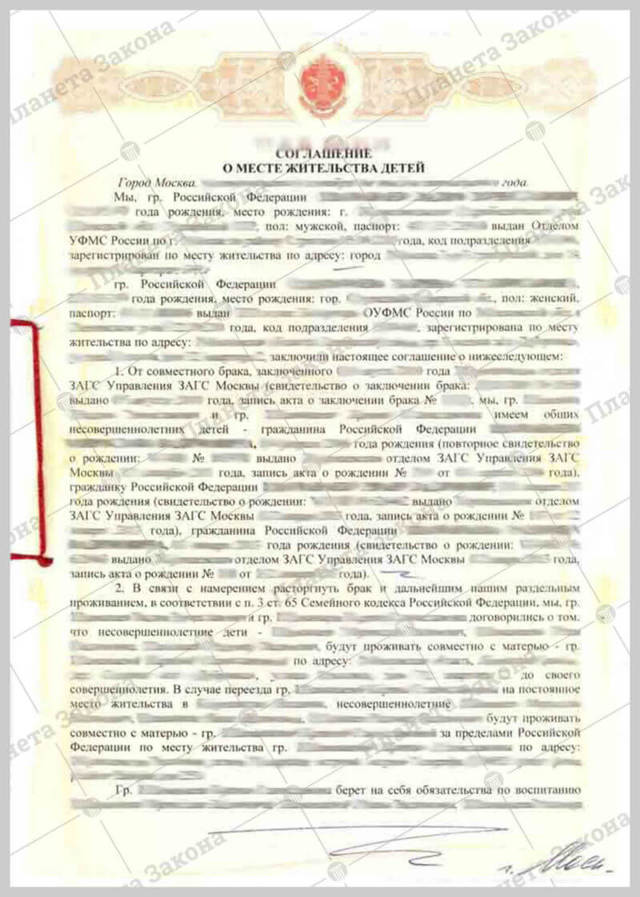
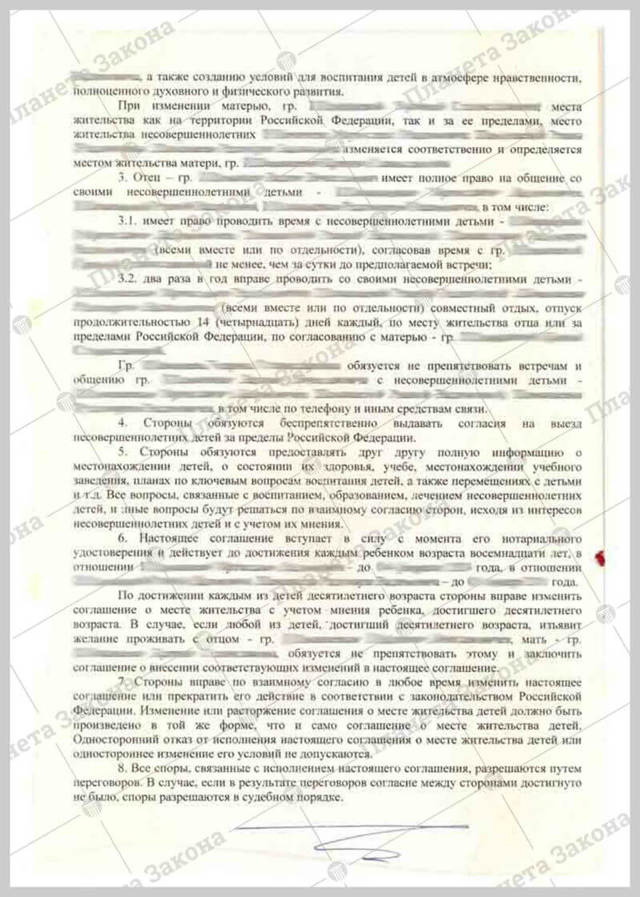
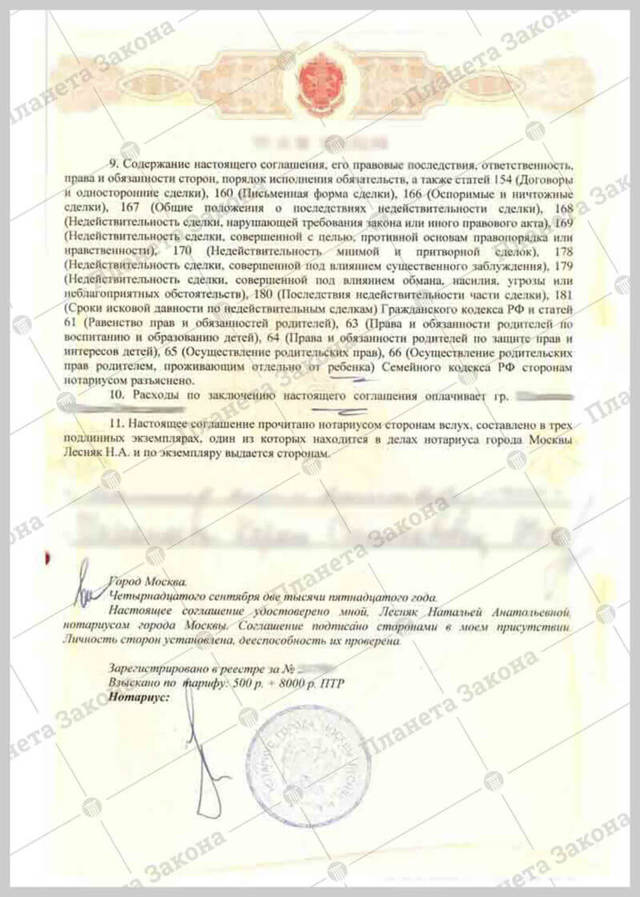
 Example of an agreement on the place of residence of children
Example of an agreement on the place of residence of children 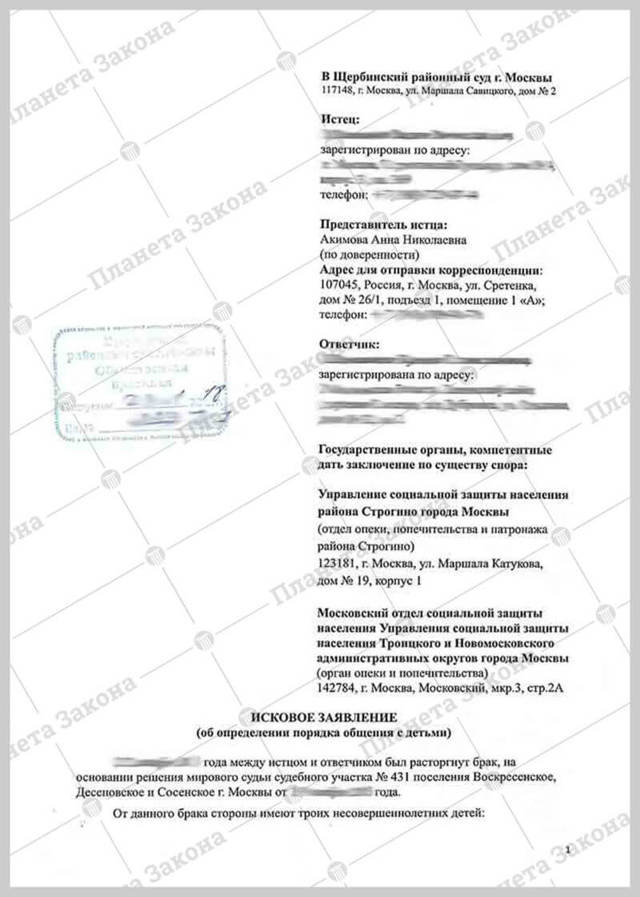
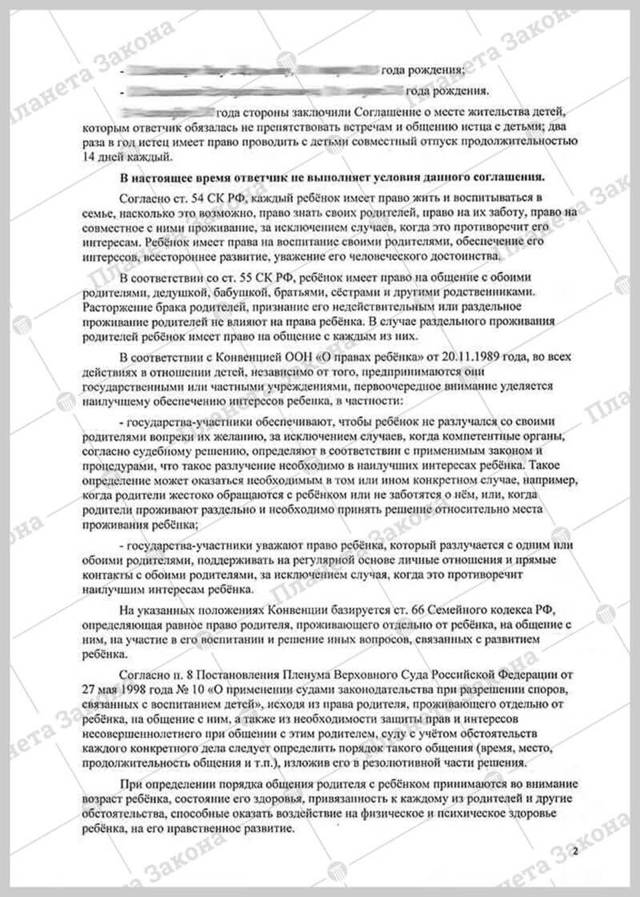
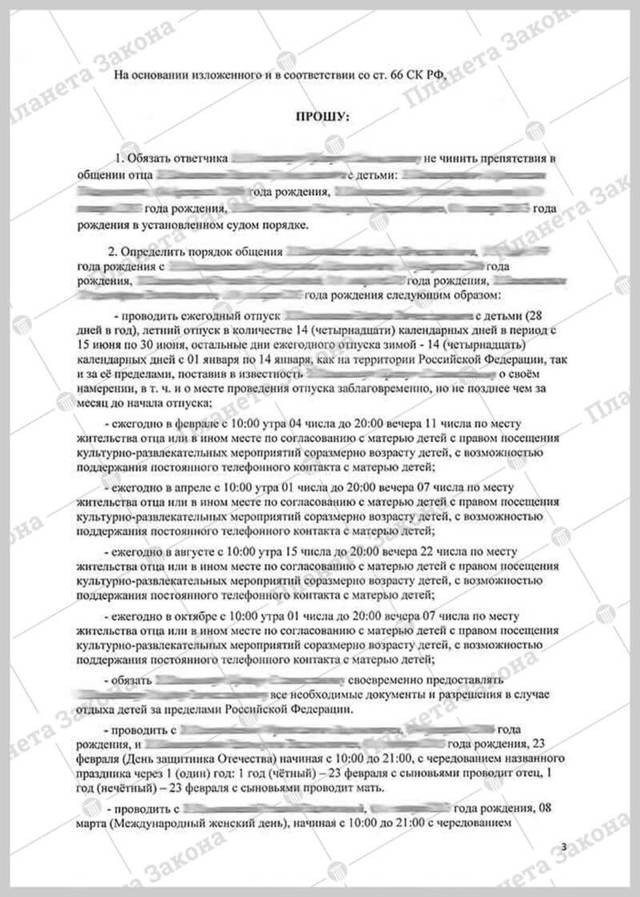
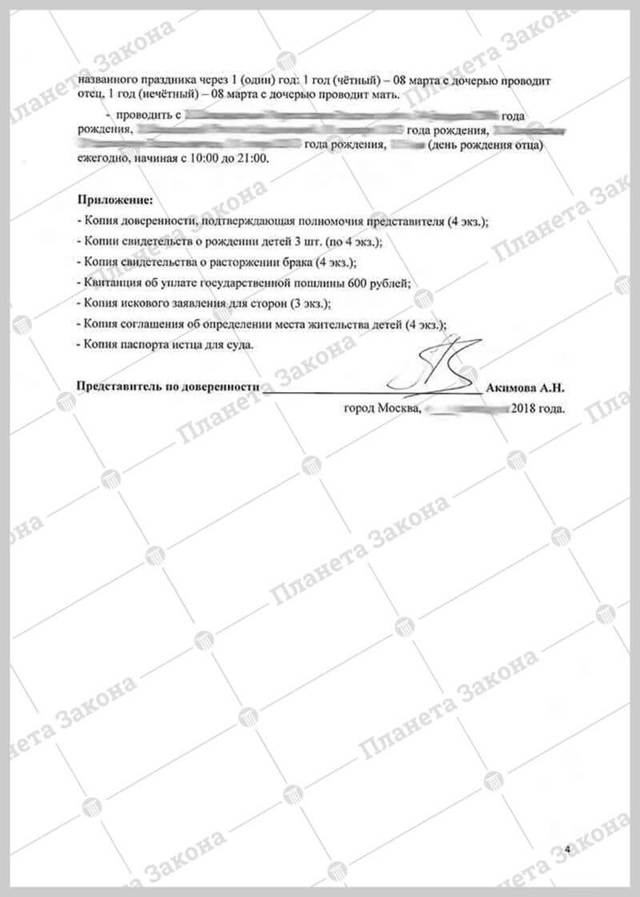 An example of a statement of claim to determine the order of communication with a child
An example of a statement of claim to determine the order of communication with a child 





